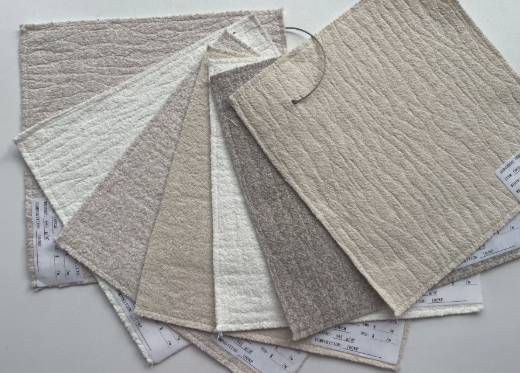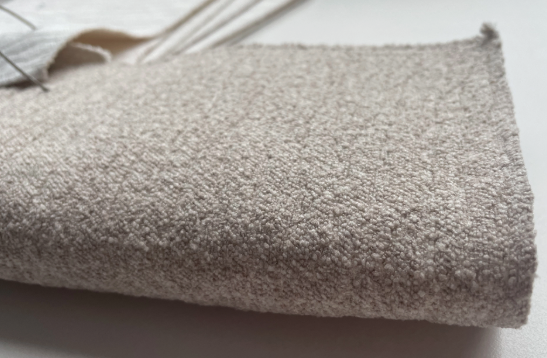close
Choose Your Site
Global
Social Media


Views: 0 Author: Site Editor Publish Time: 2025-09-11 Origin: Site

Changing sofa fabric at home can be a rewarding and cost-effective way to refresh the look of your living space. With the right tools, materials, and guidance, you can transform an old sofa into a stylish centerpiece that complements your home décor. In this article, we will delve into the process of changing sofa fabric, exploring the latest trends, and providing detailed insights to help you achieve professional-looking results.
Sofa fabric is more than just a covering for your furniture; it is a crucial element that defines the comfort, durability, and aesthetic appeal of your sofa. The right fabric can enhance the overall look of your living room, making it inviting and functional. At Hangzhou Tengshi Weaver Co., Ltd., we specialize in providing high-quality sofa fabrics that combine durability, style, and functionality. Our collection is designed to meet the demands of modern living spaces, ensuring that each fabric not only looks beautiful but also stands up to the rigors of daily use.
Investing in high-quality sofa fabric is essential for several reasons. Firstly, it ensures the longevity of your furniture. Fabrics like microfiber and polyester, known for their durability and resistance to wear and tear, can withstand the test of time. These materials are engineered to resist fading, pilling, and tearing, which means your sofa will maintain its pristine appearance for years to come. High-quality fabrics are also more resistant to stains and spills, making them ideal for households with children or pets.
Moreover, high-quality fabrics are often treated with advanced stain-resistant technologies, making them easy to maintain and clean. This means that minor spills and accidents can be easily wiped away without leaving permanent marks. Many high-quality fabrics also come with easy-care instructions, ensuring that you can keep your sofa looking fresh and clean with minimal effort. This is particularly important for busy households where regular cleaning is essential.
High-quality fabrics offer superior comfort and texture, enhancing the overall user experience. When you sit on a sofa covered in luxurious velvet or soft chenille, the difference is immediately noticeable. These fabrics not only feel better to the touch but also provide a level of comfort that can transform your living space into a cozy sanctuary. The right fabric can make your sofa inviting and comfortable, encouraging relaxation and enjoyment.
Investing in high-quality sofa fabric can also be a cost-effective choice in the long run. While the initial investment may be higher, the durability and longevity of the fabric mean that you won’t need to replace it as frequently. This can save you money over time and reduce the environmental impact of constantly replacing worn-out fabrics. At Hangzhou Tengshi Weaver Co., Ltd., we understand the importance of high-quality sofa fabric. Our collection is designed to meet the demands of modern living spaces, ensuring that each fabric not only looks beautiful but also stands up to the rigors of daily use.
The world of home décor is constantly evolving, and sofa fabric trends are no exception. Staying updated with the latest trends can help you choose a fabric that not only looks contemporary but also complements your existing décor. Here are some of the latest trends that you should consider when choosing fabric for your sofa:
With increasing awareness of environmental issues, sustainable fabrics are gaining popularity. Consumers are becoming more conscious of the impact their choices have on the planet, and this shift is reflected in the materials used for home furnishings. Materials like organic cotton, recycled polyester, and bamboo are not only eco-friendly but also offer excellent durability and comfort.
Eco-Friendly: Sustainable fabrics are produced using methods that minimize environmental impact. For example, organic cotton is grown without harmful pesticides, and recycled polyester reduces waste by repurposing existing materials.
Durability: These materials are often just as durable as their non-sustainable counterparts. Recycled polyester, for instance, maintains the strength and resilience of virgin polyester while being more environmentally friendly.
Comfort: Sustainable fabrics can be just as soft and comfortable as traditional fabrics. Bamboo, for example, is known for its silky texture and moisture-wicking properties, making it a great choice for upholstery.
Textured fabrics such as velvet, bouclé, and chenille are making a strong comeback. These materials add depth and visual interest to your sofa, making it a focal point in your living space. The tactile nature of these fabrics invites touch and adds a layer of sophistication to any room.
Velvet: Known for its luxurious feel and rich appearance, velvet can elevate any piece of furniture. It is particularly popular for its ability to reflect light and create a sense of opulence.
Bouclé: This fabric features looped yarns that give it a textured, nubby appearance. Bouclé adds a playful and modern touch to sofas, making them stand out in any setting.
Chenille: With its soft, plush texture, chenille offers a cozy and inviting feel. It is perfect for creating a comfortable and warm atmosphere in your living room.
Patterns are also a significant trend in sofa fabric. Floral, geometric, and abstract designs are popular choices, offering a way to inject personality and style into your furniture. Patterns can make a bold statement or provide a subtle accent, depending on your preference.
Floral: Traditional and timeless, floral patterns bring a touch of nature indoors. They can range from delicate and subtle to bold and vibrant, making them suitable for various décor styles.
Geometric: Geometric patterns offer a modern and sophisticated look. They can add a sense of structure and order to your living space, making it feel more contemporary.
Abstract: Abstract designs are perfect for those who want to make a unique statement. These patterns can be bold and eye-catching, adding a creative and artistic touch to your sofa.
Neutral tones like beige, gray, and white remain popular for their versatility and ability to blend with various décor styles. These colors provide a calming and cohesive look, making them a safe choice for many homeowners. However, bold colors and rich hues like deep blues, greens, and burgundies are also gaining traction, providing a way to make a statement in your living room.
Neutrals: Beige, gray, and white are timeless choices that can easily be updated with accent colors and accessories. They create a calm and balanced atmosphere, making them ideal for a variety of design styles.
Bold Colors: Deep blues, greens, and burgundies can add a sense of drama and sophistication to your living space. These colors are perfect for those who want to make a bold statement and create a focal point in the room.
Accent Colors: Consider using accent colors to complement your main fabric choice. Pillows, throws, and other accessories can add pops of color and interest without overwhelming the space.

Before you begin, it is essential to gather all the necessary tools and materials. Here’s a list of items you will need:
Staple remover
Staple gun and staples
Flathead screwdriver
Pliers
Strong scissors
Measuring tape
Notebook and pen
Sewing machine (optional)
Fabric glue (optional)
New sofa fabric
The first step in any reupholstery project is to get to know the piece of furniture you’ll be working with. Examine your sofa, noting the location of staples, any slipcovers, tufted buttons, cording, and skirts. Take detailed notes and photos for future reference. This step is crucial as it will help you understand how the sofa is constructed and guide you in the reupholstery process.
Most sofas have a lightweight layer of fabric stapled to the underside, known as the dust cover. This is usually the last piece of fabric attached to the sofa and should be the first to come off. Turn your sofa upside down, remove its legs if possible, and use a staple remover to carefully remove the staples around the dust cover. Set the dust cover aside for later use.
After removing the dust cover, you will be able to see how the other upholstery pieces were stretched and stapled to the frame. Start by removing the top layer of upholstery fabric, often the piece on the back of the sofa. Use your staple remover to gently lift the staples and discard them. Take detailed notes and photos as you remove each piece of upholstery, noting the order in which they were removed, their orientation, and any special considerations.
Use the measurements from the old fabric to purchase the new fabric. You can choose from a variety of sofa fabrics available at Hangzhou Tengshi Weaver Co., Ltd., including microfiber, polyester, and velvet. When cutting the new fabric, use the old fabric pieces as patterns to ensure a perfect fit. Use strong, sharp fabric scissors to avoid snags or frays.
Using your notes and photos as a guide, attach the new upholstery fabric in the reverse order in which you removed the old fabric. The piece you removed last should be the first piece you attach. Use a staple gun to staple the fabric back to the frame, pulling it taut to avoid wrinkles. Ensure that the fabric is stretched evenly and securely attached.
Once all the new fabric is attached, reattach the dust cover to the bottom of the sofa. This will conceal all the staple work and give your sofa a neat, finished look.
If your sofa had corded trim or other decorative elements, attach them using fabric glue or a sewing machine. This will give your sofa a polished and professional look. Additionally, consider adding finishing touches like new pillow covers or refinishing the sofa legs to complete the transformation.
When selecting sofa fabric, consider the following factors:
Choose fabrics that are durable and resistant to wear and tear. Microfiber and polyester are excellent choices for high-traffic areas.
Ensure the fabric is comfortable to the touch. Velvet and chenille offer a luxurious feel, while cotton and linen provide a more breathable option.
Opt for fabrics that are easy to clean and maintain. Stain-resistant treatments can be particularly beneficial for households with children or pets.
Select a fabric that complements your existing décor. Consider the color, pattern, and texture to create a cohesive and stylish look.
Changing sofa fabric at home is a rewarding DIY project that can significantly enhance the look and feel of your living space. By following the steps outlined in this guide and choosing high-quality fabric from Tengshi, you can achieve professional-looking results. Whether you opt for durable microfiber, luxurious velvet, or cozy chenille, the right fabric can transform your sofa into a stylish and comfortable centerpiece. So, roll up your sleeves and give your sofa a new lease on life with a beautiful new fabric.